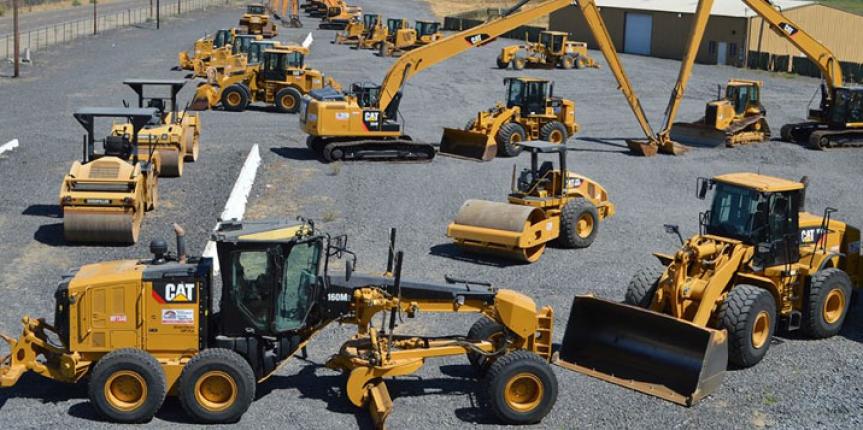Your Guide to Buying Used Industrial Equipment
Navigate the pre-owned industrial machinery market with confidence using our comprehensive buyer's guide.

Used industrial equipment can offer significant savings for businesses, but it's crucial to make informed decisions. In this guide, we'll delve into key considerations and tips for navigating the pre-owned industrial machinery market.
Your Comprehensive Guide to Buying Used Industrial Equipment
There's a whole world of used industrial machinery out there - understanding the market and making smart choices can help you get the best return on your investment. Here, we'll outline everything you need to know.
Table of Contents
- Understanding the Used Industrial Equipment Market
- Evaluating the Condition of Used Industrial Equipment
- Considering the Cost of Used Industrial Equipment
- Selecting a Reliable Dealer for Used Industrial Equipment
- Doing Prior Research Before Buying Used Industrial Equipment
- Important Tips for Buying Used Industrial Equipment
- Final Thoughts on Buying Used Industrial Equipment
Understanding the Used Industrial Equipment Market

Buying used industrial equipment can be a great choice for companies seeking to save money. However, it's essential to understand the climate of this market segment.
The market for used industrial machines is diverse and vast. It ranges from heavy-duty construction machinery to delicate laboratory apparatus. With such a broad spectrum, understanding the trends in particular categories can be crucial. Be aware of seasonality, depreciation rates, and fluctuating demand which can greatly affect pricing.
But worry not, resource-rich platforms like DealerDump offer plenty of insights and market data to guide your purchase journey.
Evaluating the Condition of Used Industrial Equipment

Ensuring the used industrial machinery you are considering is in good condition is paramount. It’s not just about the cosmetic state but more importantly, about functionality, efficiency and safety.
Mechanical Inspection
A thorough mechanical inspection should be top of your list. Get a qualified technician to assess the equipment. Check components like the engine, electrical system, hydraulics, and the overall structure.
- Test the performance: Don't just rely on visual inspections. Run the equipment to test its performance and identify possible hidden issues.
- Check the records: Previous maintenance and repair records give you a hint at how the equipment has been taken care of.
Considering the Cost of Used Industrial Equipment
A crucial aspect in purchasing used industrial equipment is the cost implications. Beyond the initial buying price, you need to consider its 'total cost of ownership'.
Total cost of ownership factors in costs such as:
- Operating costs like fuel and power consumption
- Maintenance and repair expenses
- Inspection costs
- Depreciation
Comparing the total cost of ownership of a used equipment with a new one helps identify the actual savings and whether the purchase would be a worthy investment.
Selecting a Reliable Dealer for Used Industrial Equipment

In the business of used industrial machinery, the credibility and reliability of the dealer can make a world of difference. Here's what to look for:
- Transparency: A good dealer will be forthright about the equipment’s history, condition, and pricing.
- Support: Post-sale support is crucial, especially for bigger machinery. Some dealers offer training, maintenance, and other services that can be invaluable for the buyer.
- Reputation: Check on their reputation. Have they been in business for long? Are customer testimonials and reviews positive?
Selecting a reliable dealer goes a long way in ensuring your investment in used industrial equipment is safe and beneficial.
Doing Prior Research Before Buying Used Industrial Equipment

Research is essential when stepping into the realm of pre-owned industrial machinery. It goes beyond just knowing the going rates and looking up specifications. You should do a deep dive into the following areas:
Equipment History
The historical background of the machine can reveal a lot. Who was the previous owner? What was the machine primarily used for? Has the equipment been involved in any accidents? This kind of information can offer valuable insights.
Market Trends
Current and future trends in the equipment market matter. Is the model you're thinking of purchasing likely to be phased out soon? Is there newer technology expected on the market that might make your investment obsolete?
Doing thorough research will place you in a better position to make informed purchases.
Important Tips for Buying Used Industrial Equipment
As you navigate the used equipment market, here are a few expert tips to keep in mind:
- Always understand what you need the machinery for - the specific applications and tasks.
- Don’t rush. Take your time and ensure all aspects of the equipment and the purchase check out.
- Explore financing options. Some dealers offer attractive financing deals that can make your purchase more affordable.
- Know your rights and responsibilities as a buyer. Understand the terms and conditions before signing any documents.
Final Thoughts on Buying Used Industrial Equipment
Purchasing used industrial equipment can be a significant boost to your operation if done correctly. The potential cost savings are undeniable, but it's essential to tread carefully.
To recap, understanding the market, evaluating the equipment condition, factoring in total cost, selecting a reliable dealer, and thorough pre-purchase research are keys to finding quality used machinery that offers value.
Remember to leverage platforms like DealerDump for a rich array of resources that can guide your search and decision-making process.
So, ready to dive into the used industrial equipment world? Equipped with this guide, you can navigate it with confidence and make informed decisions for your business.
What's Your Reaction?











































































